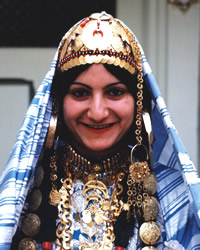Jewish, Tunisian in Israel

Photo Source:
Magnes Collection - Flickr
Creative Commons
|
Send Joshua Project a map of this people group.
|
| People Name: | Jewish, Tunisian |
| Country: | Israel |
| 10/40 Window: | Yes |
| Population: | 12,000 |
| World Population: | 13,000 |
| Primary Language: | Hebrew |
| Primary Religion: | Ethnic Religions |
| Christian Adherents: | 0.00 % |
| Evangelicals: | 0.00 % |
| Scripture: | Complete Bible |
| Ministry Resources: | Yes |
| Jesus Film: | Yes |
| Audio Recordings: | Yes |
| People Cluster: | Jewish |
| Affinity Bloc: | Jewish |
| Progress Level: |
|
Introduction / History
Before WWII, Tunisia was a French colony. The French stood in the way of Tunisian Arabs, who would have oppressed the Jewish minority. When the Nazis occupied Tunisia during the war, they enforced anti-Jewish policies and confiscated Jewish lands until the Allied forces drove them out. In 1956, Tunisia was freed from French rule, but their new leadership changed into an oppressive dictatorship. It was then that Tunisian Jews began immigrating en masse to the new Jewish homeland.
In Israel today, the Tunisian Jewish community has its own feasts and celebrations. According to the Stanford University publication, "Homelands and Diasporas," one of their popular practices today is the Feast of Jethro. They gather together for food in the synagogues to celebrate the end of a plague in their community 2,000 years ago.
What Are Their Lives Like?
Language is one of the distinguishing features among most Jewish groups in Israel. Most have a heart language. One exception is the Tunisian Jews who have switched from Arabic to Hebrew since fleeing Tunisia after 1948.
Israel s countryside is full of villages and towns. The original kibbutzim are turning into villages. Those in the rural sector use modern farming machinery and irrigation techniques, making their farms highly productive.
Israel is highly urbanized, and they have a strong tech industry. A high percentage of them have white-collar jobs. This small country has the 26th largest GNP of any nation. Israel has three education and schooling systems for Jewish children. Children are trained to compete in a modern urban economy and in the fundamentals of Judaism and the Torah.
What Are Their Beliefs?
Judaism is roughly divided into three streams.
Almost half are Hilonim, secularized Jews. Their identity is in the nation-state of Israel, not in the Jewish religious system. They participate in Jewish rituals such as the Passover Seder and lighting Hanukkah candles because these reinforce their identity as being Israeli and culturally Jewish. They usually oppose shutting down businesses and public transportation on the Sabbath.
The Datiim are religiously devout Jewish people who believe in the God of the Bible and usually attend Jewish religious services. Unlike the most fundamental Jewish people, they want to travel the world, produce productive businesses, and get involved with politics and the military. For religious reasons, they will not ride public transportation on the Sabbath or open their businesses.
The Haredim are the most religiously devout of any Israeli Jewish group. Their close friends are all within the Haredim community, and they will not marry outside their group. They are noted for being secluded from the rest of society. They dress far more conservatively than other Jewish groups. Haredim men usually attend religious institutions. There is an ongoing controversy about their exemption from military service. They have their doubts about the legitimacy of Israel as a nation-state because they believe the Messiah has not yet come to establish Israel.
What Are Their Needs?
Tunisian Jewish people are in Israel largely because they need their own nation for protection. For hundreds of years, they dealt with severe persecution. Most Jewish people from Tunisia want nothing to do with Islam or Christianity. French colonialists were Roman Catholic. This is a major impediment to spreading the gospel.
Prayer Points
Pray that as the gospel is shared with Tunisian Jews, it will not be understood as the fulfillment of what God promised humanity through Abraham thousands of years ago.
Pray for a spiritual hunger among Tunisian Jews who view their Jewishness as an ethnic identity but don t see the connection with their need for the only Messiah.
Ask the Lord to soften the hearts of Tunisian Jews towards Christians so that they might hear and receive the message of salvation.
Pray that God will grant Jewish believers favor as they share their faith in Christ with Tunisian Jews.